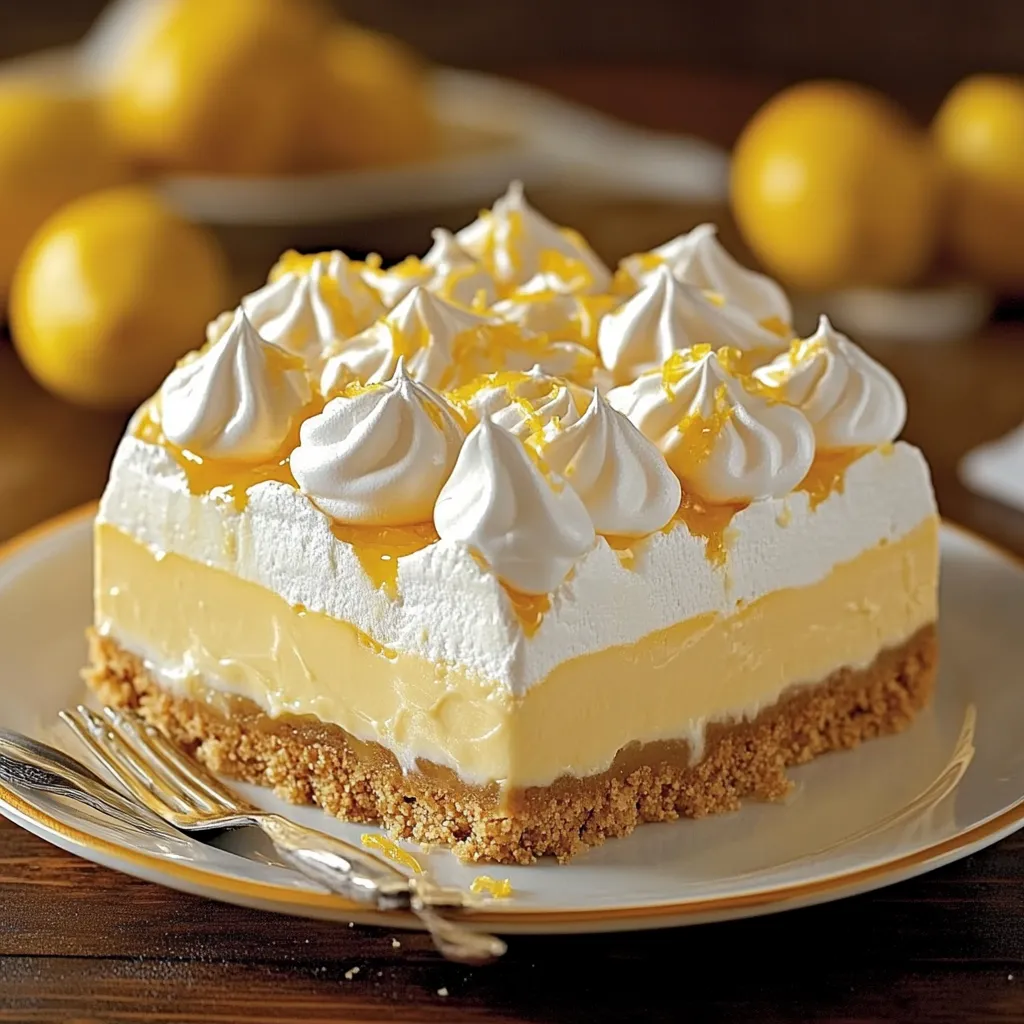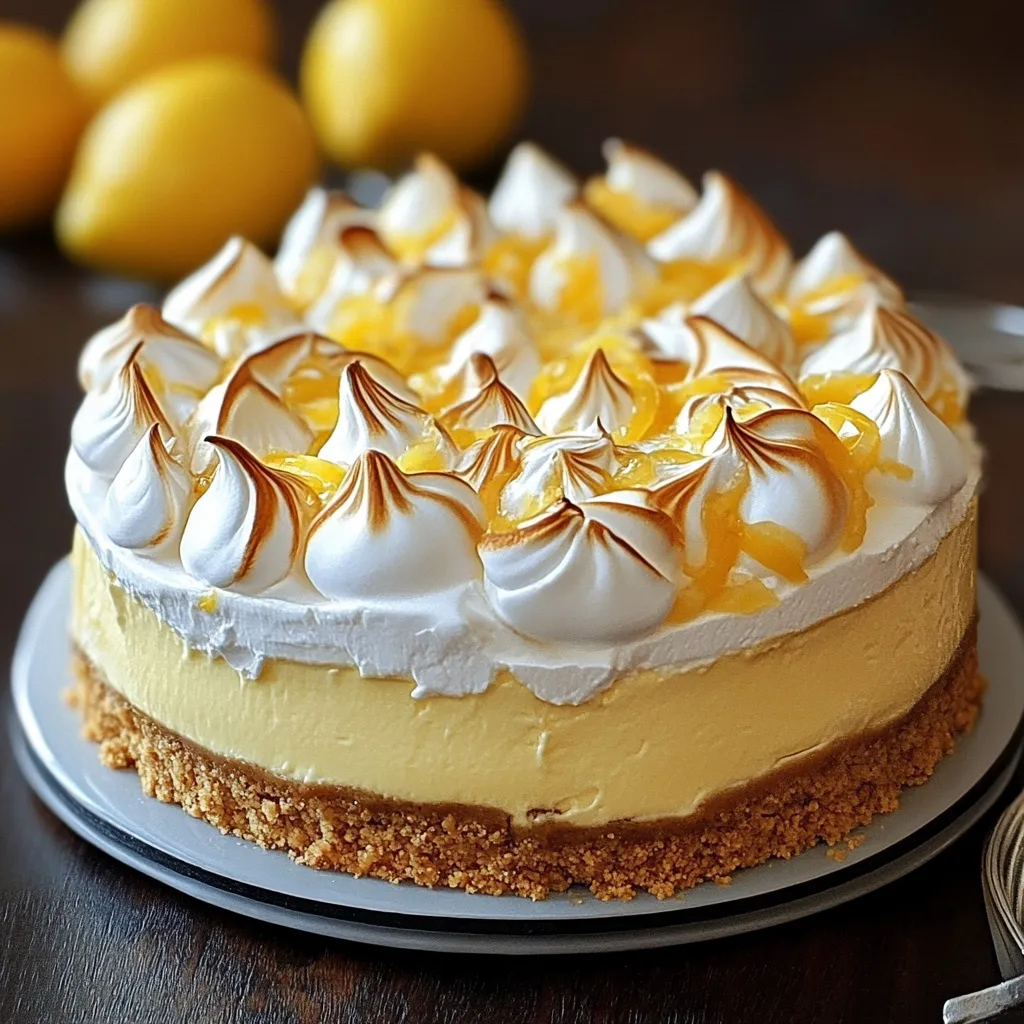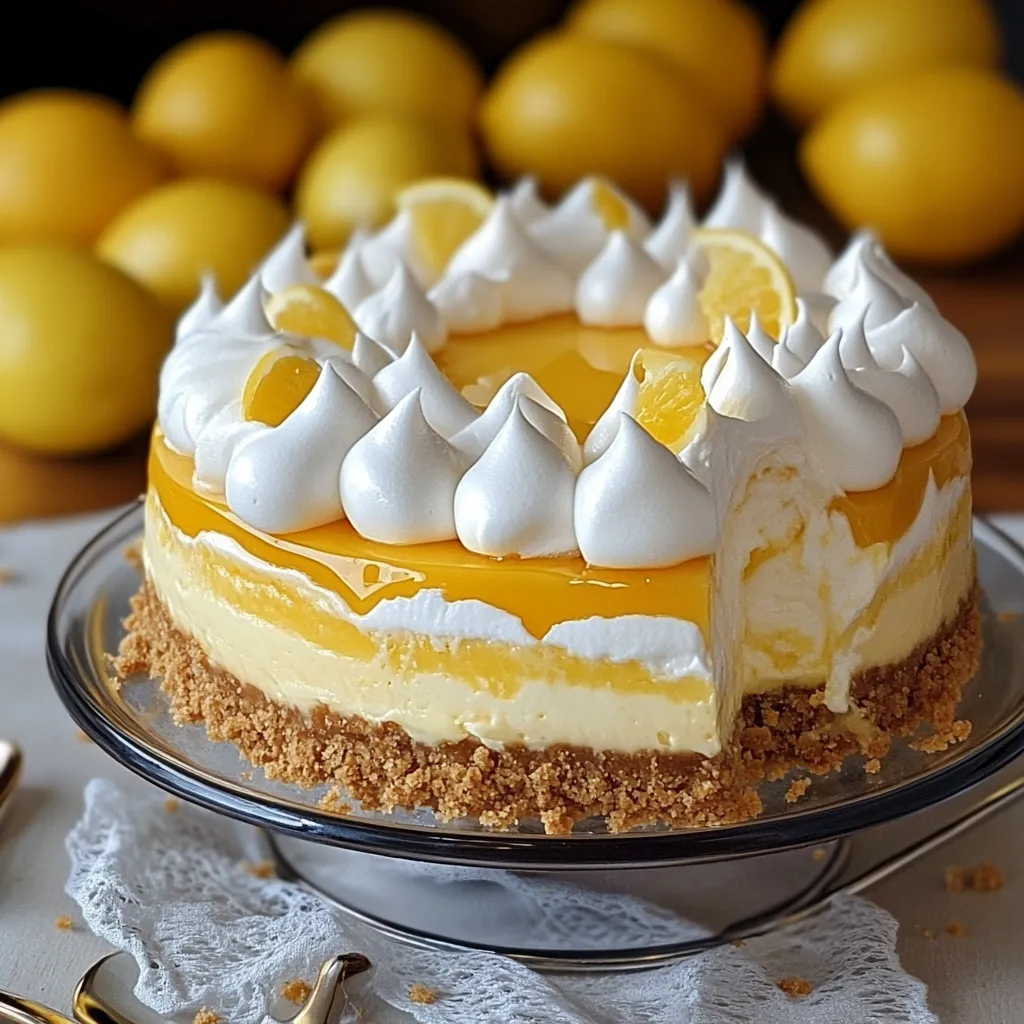 Pin it
Pin it
This triple lemon meringue cheesecake brings together the best of two classic desserts, creating a showstopping treat that balances tangy lemon with creamy cheesecake and fluffy meringue. The multiple layers of lemon flavor make this dessert a citrus lover's dream, perfect for special occasions when you want to impress.
I first created this recipe for my mother's birthday, as she adores anything lemon. The combination of creamy cheesecake, tart lemon curd and billowy meringue had everyone requesting seconds and asking for the recipe before they left.
Ingredients
- Graham cracker crumbs: create a buttery foundation that complements the tangy filling. Look for boxes specifically labeled crumbs to save time crushing
- Cream cheese: forms the rich base of our cheesecake. Always use full fat cream cheese at room temperature for the smoothest texture
- Fresh lemon juice: provides authentic flavor that bottled versions simply cannot match. Roll lemons firmly on the counter before juicing to extract maximum juice
- Lemon zest: contains essential oils that provide intense citrus flavor. Only grate the yellow part as the white pith is bitter
- Sour cream: adds tanginess and creates an incredibly smooth texture in the filling
- Eggs: provide structure to both the cheesecake and curd. Use room temperature eggs for best incorporation
- Cream of tartar: stabilizes the egg whites in the meringue, helping achieve perfect peaks that won't weep or collapse
Step-by-Step Instructions
- Prepare the crust:
- Combine graham cracker crumbs with sugar and melted butter until every crumb is moistened. The mixture should hold together when pressed between your fingers. Press firmly into the bottom of a springform pan using the flat bottom of a measuring cup for even compression. Bake until fragrant and slightly darkened around the edges, about 8 10 minutes. The prebaking step ensures your crust stays crisp beneath the creamy filling.
- Craft the cheesecake filling:
- Beat room temperature cream cheese with sugar until completely smooth with no lumps remaining, about 3 minutes on medium speed. Scrape down the bowl thoroughly between each addition. Incorporate vanilla, then add eggs one at a time, allowing each to fully blend before adding the next. Gently fold in sour cream, fresh lemon juice, and zest until just combined. Overmixing can incorporate too much air, leading to cracks during baking.
- Bake with care:
- Pour the silky filling over the cooled crust and smooth the top. Bake in a moderate oven until the edges are set but the center still has a slight jiggle when gently shaken. This gradual cooling method prevents the dramatic temperature change that causes cheesecakes to crack. Allow to cool in the turned off oven for an hour before refrigerating at least 4 hours or preferably overnight.
- Create the lemon curd:
- Whisk together lemon juice, sugar, and eggs in a saucepan over low heat. Stir constantly with a silicone spatula, making sure to scrape the bottom and sides of the pan to prevent the eggs from scrambling. The mixture will gradually thicken until it coats the back of a spoon and holds a clear path when you draw your finger through it. Remove from heat and stir in butter and lemon zest. The curd will continue to thicken as it cools.
- Whip the meringue:
- In a completely clean and dry mixing bowl, beat egg whites and cream of tartar until foamy. Gradually add sugar while continuing to beat until stiff, glossy peaks form that stand straight up when the beater is lifted. The meringue should feel smooth between your fingers with no sugar grains remaining. This slow addition of sugar ensures a stable meringue that won't weep.
- Assemble the layers:
- Spread the cooled lemon curd evenly over the chilled cheesecake. Dollop the meringue on top, starting from the edges and working toward the center. Use the back of a spoon to create decorative peaks and swirls. Make sure the meringue completely covers the lemon curd layer and touches the edges of the pan to prevent shrinkage during baking.
- Brown the meringue:
- Place the assembled cheesecake in a hot oven just long enough for the meringue to turn golden brown, about 5 7 minutes. Watch carefully to prevent burning. This final baking step cooks the egg whites in the meringue, making them safe to eat while creating that beautiful toasted marshmallow flavor. Allow to cool completely before refrigerating.
 Pin it
Pin it
You Must Know
My favorite part of this recipe is the lemon curd layer. I remember the first time I made it, watching anxiously as the mixture slowly transformed from a thin liquid to a luscious, velvety spread. The moment when it finally coats the back of a spoon is pure kitchen magic that still brings me joy every time.
Preventing Cheesecake Cracks
The most common issue with cheesecakes is cracking on the surface. While our lemon curd and meringue layers will cover any imperfections, you can ensure a perfectly smooth cheesecake by using a water bath. Simply wrap the outside of your springform pan in several layers of heavy duty aluminum foil, place it in a larger roasting pan, and pour hot water halfway up the sides before baking. This gentle, moist heat helps the cheesecake bake evenly throughout.
Storage Tips
Your triple lemon meringue cheesecake will keep beautifully in the refrigerator for up to 5 days. Store it in the springform pan with the ring still attached until ready to serve, then cover loosely with plastic wrap, being careful not to disturb the meringue. The meringue may weep slightly after the first day, but this won't affect the flavor. For longer storage, you can freeze the cheesecake without the meringue topping, then add fresh meringue after thawing.
 Pin it
Pin it
Serving Suggestions
This showstopping dessert deserves an elegant presentation. Slice with a thin, sharp knife dipped in hot water and wiped clean between cuts for the cleanest edges. Serve on chilled plates alongside fresh berries or a small scoop of raspberry sorbet for color contrast. A sprig of fresh mint makes a beautiful garnish that complements the lemon perfectly. For a special touch, place paper thin lemon slices dipped in sugar around the plate.
Frequently Asked Questions
- → How is the graham cracker crust made?
The graham cracker crust is made by combining graham cracker crumbs, melted butter, and sugar. Press this mixture into the bottom of a springform pan and bake for 8-10 minutes at 325°F until set.
- → What gives the cheesecake its lemon flavor?
The lemon flavor in the cheesecake comes from fresh lemon juice and zest added to the cream cheese mixture during preparation, creating a tangy and refreshing taste.
- → How do I prepare the lemon curd?
The lemon curd is made by cooking fresh lemon juice, sugar, and eggs in a saucepan over low heat while whisking constantly until thickened. Butter and lemon zest are then added for extra richness and flavor.
- → What is the secret to fluffy meringue?
To achieve fluffy meringue, beat egg whites with cream of tartar until soft peaks form, then slowly add sugar while continuing to beat until stiff peaks are achieved. Ensure your bowl and beaters are clean and dry for best results.
- → Why does the cheesecake need to chill before assembling?
The cheesecake must chill for at least 4 hours or overnight to fully set and firm up. This ensures clean layers and stability when adding the lemon curd and meringue topping.
